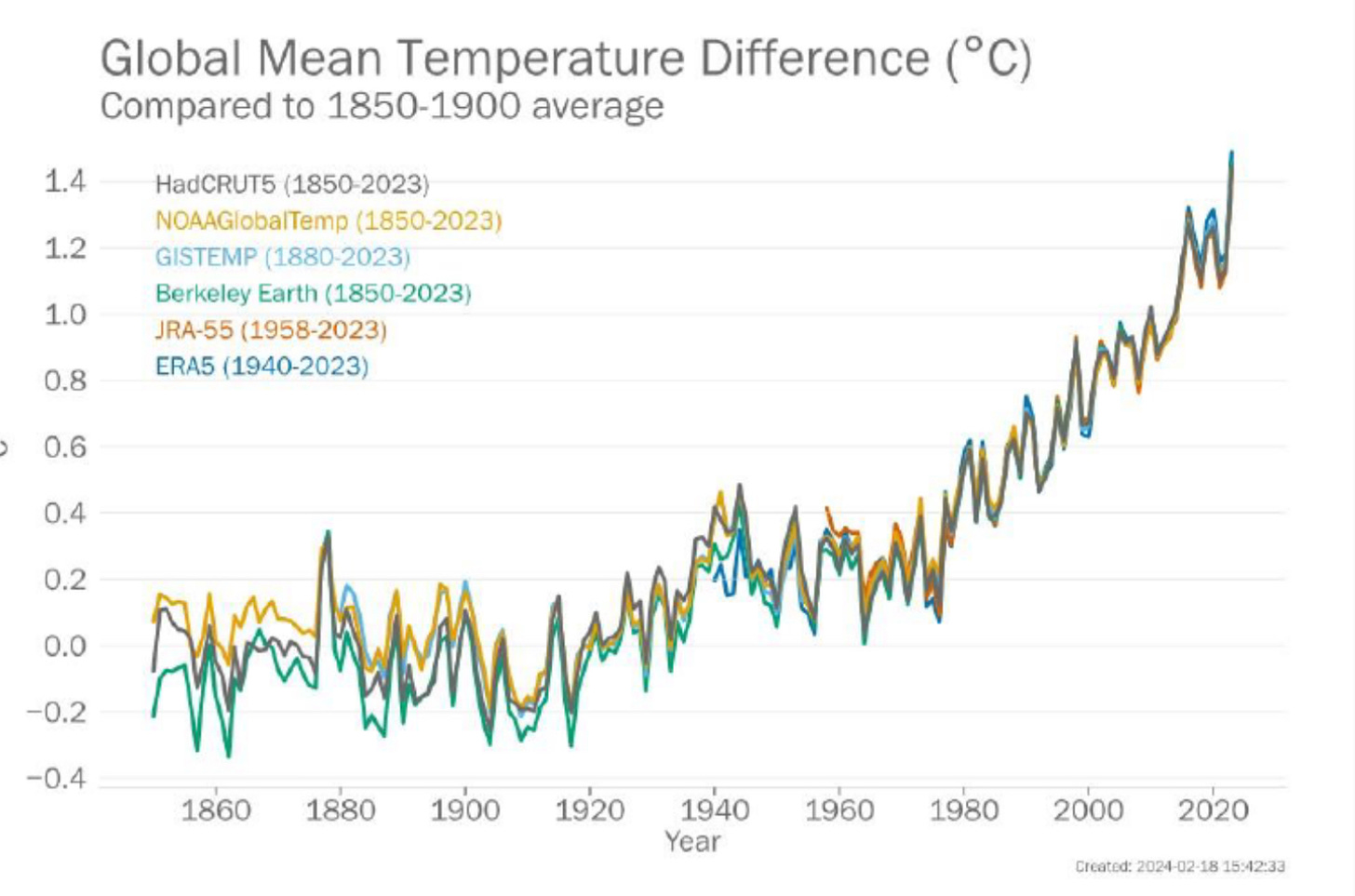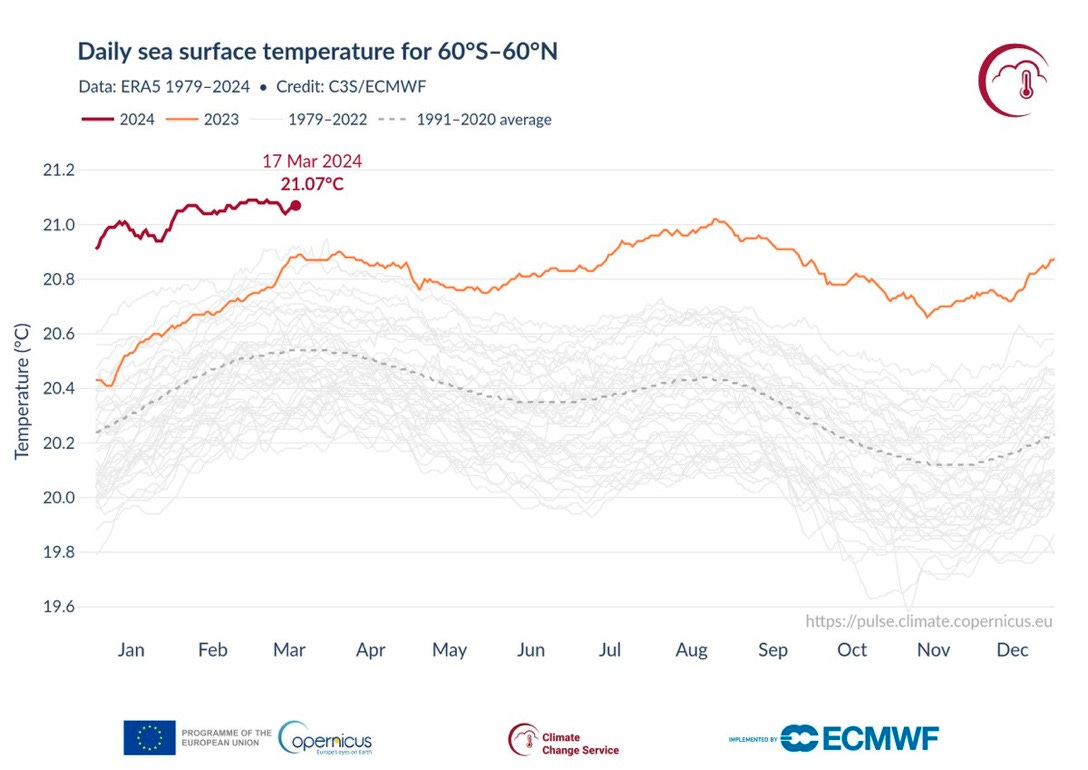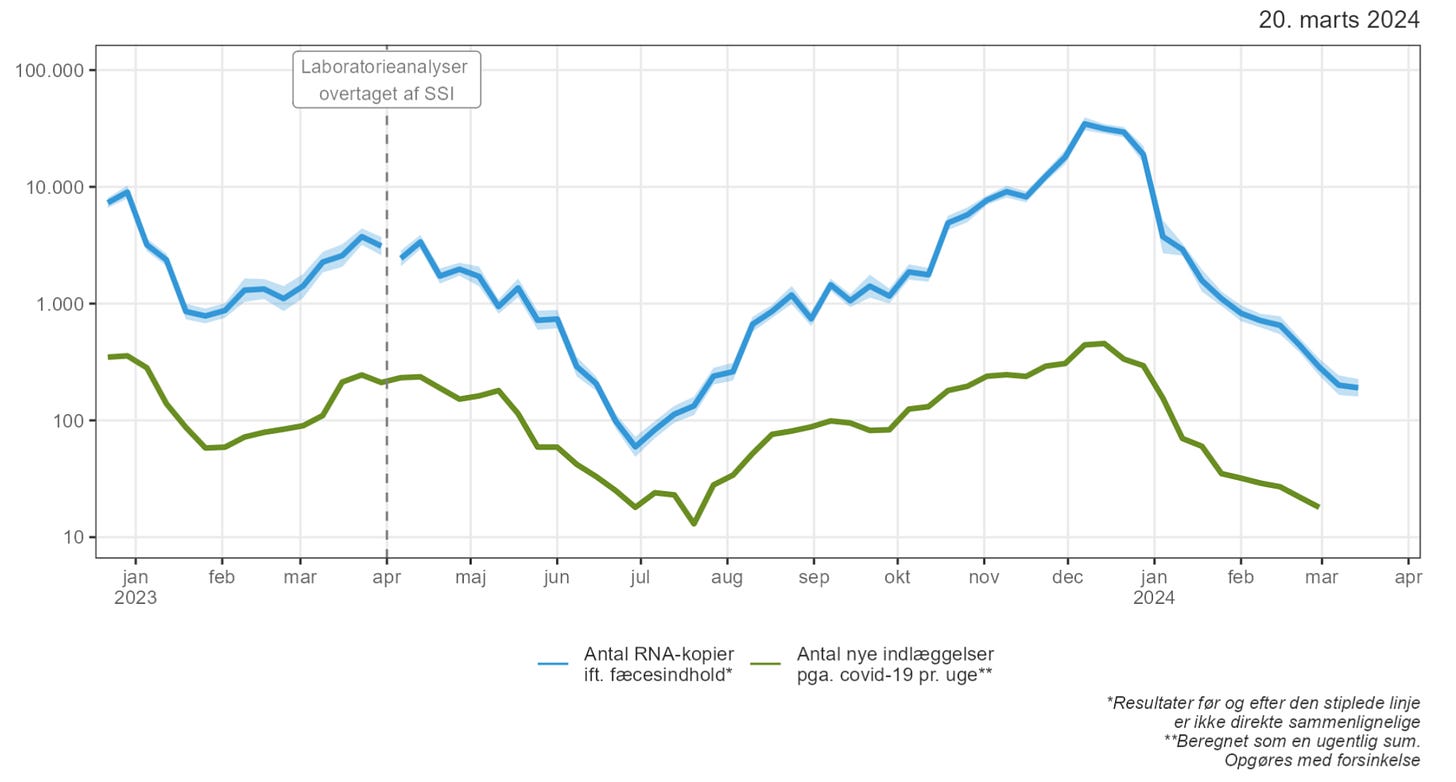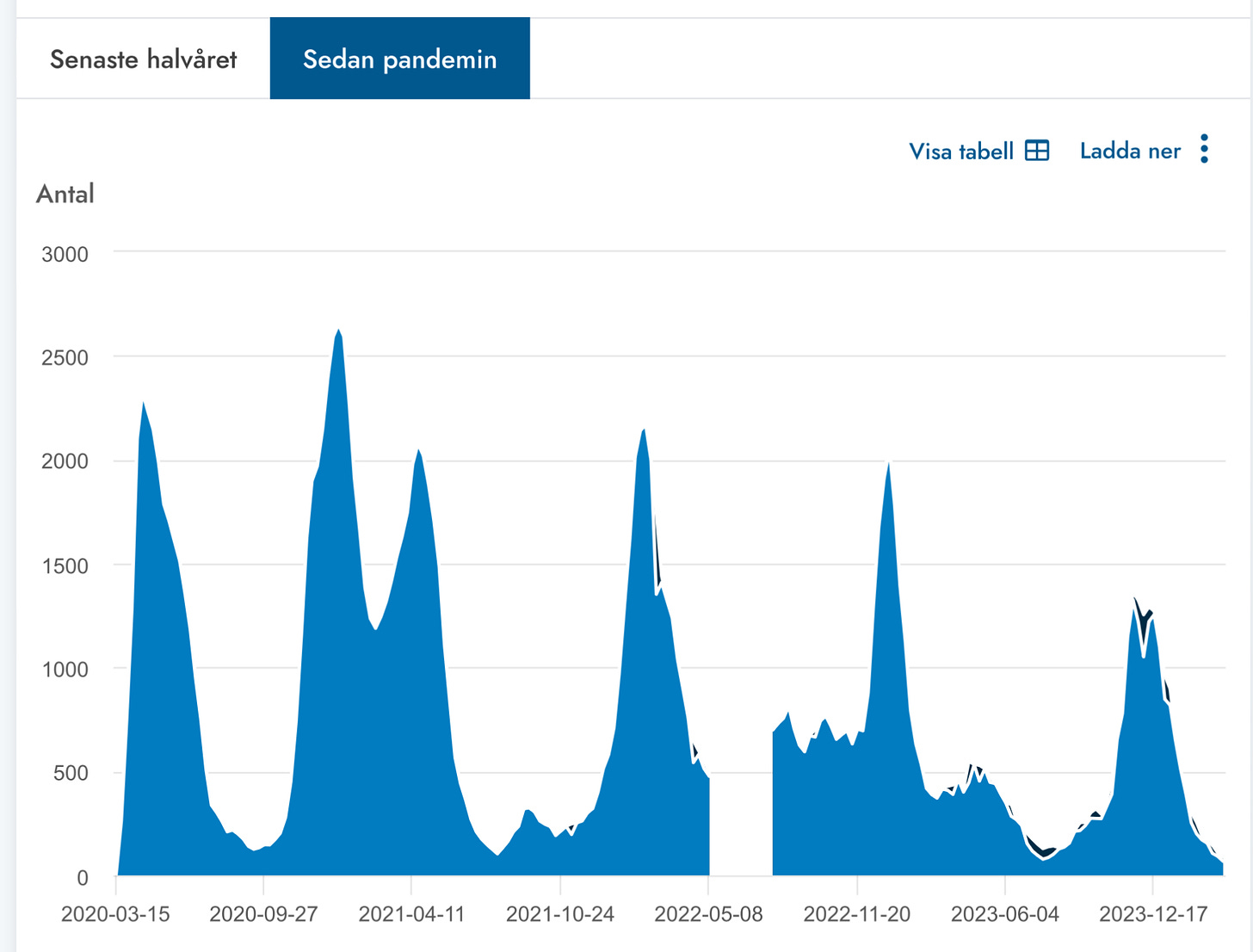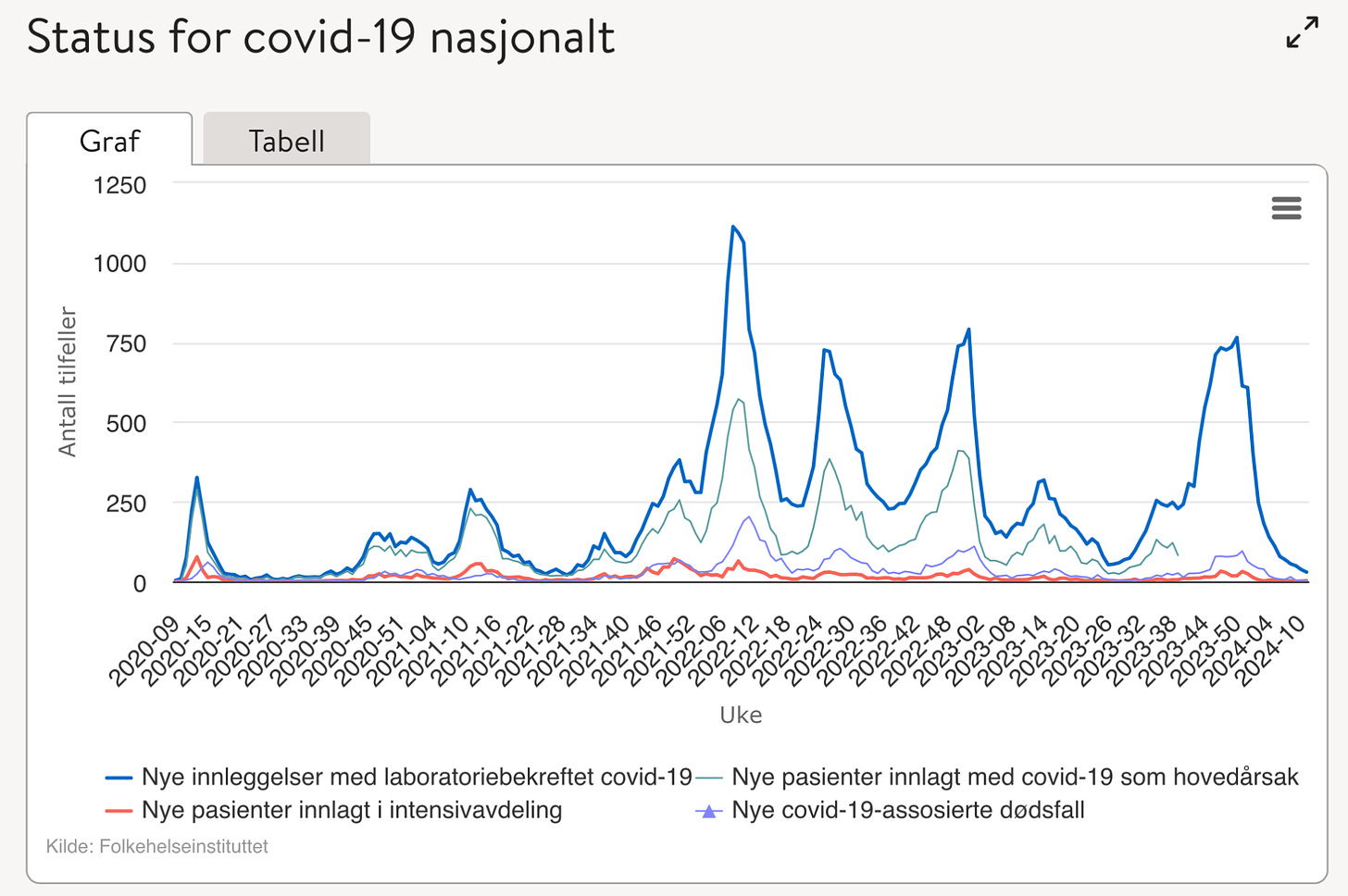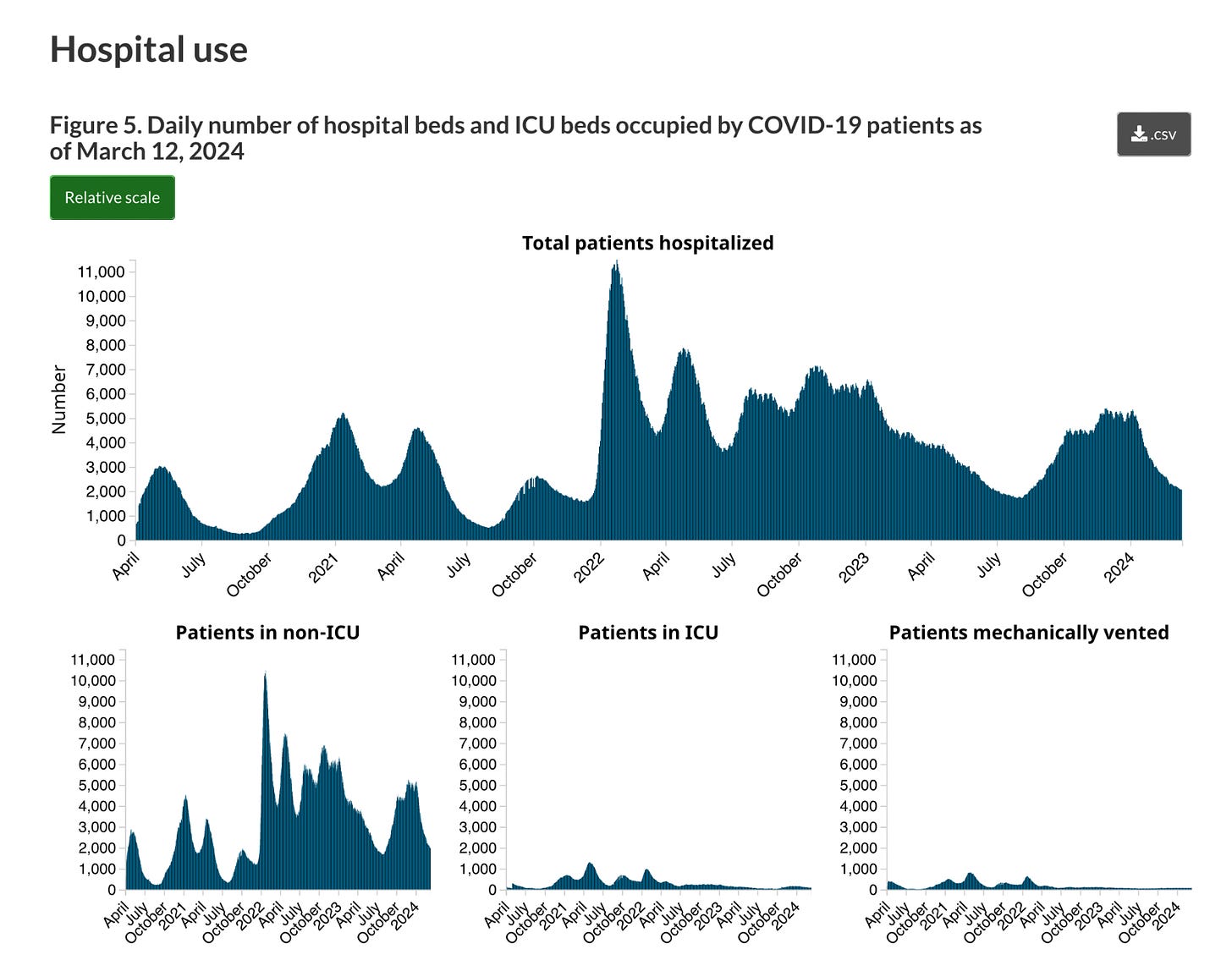🍃Environment & Energy⚡️
🌍
The World Meteorological Organization is issuing a climate red alert. Its annual State of the Global Climate report released this week was full of alarming news. 2023 was the hottest year on record for the ninth consecutive year, the worlds oceans hit record temperatures, sea level rise is increasing, and sea ice and glaciers are melting faster than ever before. This is not to mention the pages documenting the litany of extreme weather events that struck around the world last year.
Basically, the report in summary says that by every conceivable measure climate change indicators are rising at unprecedented levels.
WMO Secretary-General Celeste Saulo:
“The WMO community issues a red alert to the world. Never have we been so close to the Paris Agreement's 1.5° C, even if only temporarily, but climate change is about much more than temperatures. What we saw in 2023 was also an unprecedented warming of the world's oceans, the retreat of glaciers, and a loss of sea ice in Antarctica, which is a cause for particular concern.”
On an average day last year, nearly a third of the world’s were suffering from a maritime heat wave damaging vital marine ecosystems. By the end of 2023, over 90% of the ocean had experienced heat waves at some point during the year.
In 2023, the world’s glaciers also suffered the greatest loss of ice recorded since 1950. Antarctic sea ice was one million square kilometers smaller last year, the lowest levels ever recorded
However, there report also contained a glimmer of hope as it noted that 2023 saw a massive shift to renewable energy with green energy generation increasing by almost 50% year over year.
-
The maritime heat wave is not letting up so far this year. Data from the European Union’s Climate Change Service Copernicus shows “worrisome sea surface temperatures” are continuing in 2024. It says that daily average global sea surface temperatures reached +21.07°C on March 17.
-
Last year, just seven countries in the world met the air quality standard set out by the World Health Organization. That means that most countries in the world have air that contains particulate matter exceeding levels the WHO considers healthy.
According to an air quality report from Swiss-based IQAir only Finland, Australia, Estonia, Iceland, Grenada, Mauritius, and New Zealand met the WHO air quality standard.
Per the report:
"Exposure to PM2.5 air pollution leads to and exacerbates numerous health conditions, including but not limited to asthma, cancer, strokes, and lung disease. Additionally, exposure to elevated levels of fine particles can impair cognitive development in children, lead to mental health issues, and complicate existing illnesses including diabetes.”
It found that the most polluted countries in the world, including Bangladesh, India, Pakistan, and Tajikistan, had particulate matter in the air that was more than ten times higher than recommended levels.
Vehicle emissions, industrial pollution, and the burning of coal, wood, and manure for cooking and heat all contribute to harmful particulate matter in the air.
According to the Guardian, seven million people around the world die every year from air pollution. Seniors, young children, and those battling underlying health issues are most at risk due to unhealthy air quality.
🇩🇰
The Danish government is trying to cobble together a long-term strategy to address an unfolding crisis in Danish inland waters. The Kattegat connecting the North and Baltic Seas is suffering from a critical oxygen shortage. The oxygen-depleted waters have wiped out invertebrate species and chased off fish and other sea life. One of the reasons the waters are so starved for oxygen is nitrogen-rich fertilizers running off agricultural lands and into waterways.
As negotiations begin between the governing parties Danish Environment Minister Magnus Heunicke says part of the agreement would earmark millions of kroner to buy up land, buildings, and facilities that are getting in the way of nitrogen-reducing projects.
The parties are negotiating over a budget of 325 million Danish kroner (about $64 million Cdn) of which 80 million kroner would be allocated for the purchase of so-called low-lying soils, farmland lying close to waterways allowing for fertilizer seepage.
-
It has been five months since a historic storm surge caused widespread damage along the Danish coast and clean-up and restoration efforts are still ongoing. Aabenraa and Sønderborg Kommunes have announced that one of Denmark’s most famous hiking trails will soon be back online. The 84-kilometer-long Gendarmstien trail runs from Padborg to Skovby in Southern Jutland.
Nature Agency Sønderjylland Forest Officer Christian Mikkelsen says most of the trail has been restored after widespread flood damages.
“81 kilometers are safe so far but you must respect the roadblocks in the area. We also have signs in several places stating that there may be a risk of landslides, so you must be aware.”
The hope is that the entire trail will be ready to go before summer. The route has a ‘Best in Europe’ certification meaning it is one of the best hiking routes in the EU.
-
The town of Vandel near Vejle has used people power to become more environmentally friendly and to reduce greenhouse gas emissions. Funding for a citizen-driven climate village project has now taken on a life of its own. Using the repurpose, reuse, repair, and recycle theme the people in Vandel have continued to push each other to become more and more green.
The town has set up free exchange containers where people can drop off items they don’t use or pick up items they can find a purpose for. The town now features a ‘climate hub’ called Futurum. Inside are various public and multi-use spaces and a repair cafe where people can get broken items repaired and refurbished.
Since 2021, the village has reduced its CO2 emissions by 30% on average for each household. The biggest changes have come from altering transportation habits and switching homes to district heating. The hope is to inspire other towns across Denmark to follow suit.
-
A Klimaborgerting (citizens climate committee) has submitted a booklet to politicians at Copenhagen City Hall with 67 proposals to help make the city more climate-conscious and to help reduce CO2 emissions. The proposals include creating car-free boulevards for bicycles, building more housing communities, and adding additional recycling sites.
The proposals will now be formalized so that city politicians can deal with them one by one this winter.
The Klimaborgerting, which hilariously translates directly as the Climate Citizens Thing, is made up of 36 people.
-
The wastewater from the landslide of heavily polluted soil at the Nordic Waste site near Randers is so toxic it poses serious health risks to any person or animal who comes into contact with it. That is the concerning finding from the Patient Safety Authority. It says that even a one-time exposure can constitute an “acute health hazard.” The wastewater is so toxic it can cause corrosion, allergic skin reactions, and serious eye damage on contact. If it should somehow be ingested the agency says it will eat away the skin inside the mouth and throat.
The agency also raises a concern that there are no barricades or fencing keeping people or animals away from the basins where the toxic wastewater is being collected. The Kommune says it is too large an area to simply fence off but they have posted warning signs.
The Kommune says that the plan is to collect all of the wastewater and then filter and clean it before funneling the water into treatment plants.
🇸🇪🇫🇮🇳🇴
EU funding will help to protect critically endangered Arctic foxes in Finland, Norway, and Sweden. The European Union has allocated €2.3 million to authorities in the three Nordic nations for a two-year cross-border conservation effort. In the early 2000s, there were as few as 40 Arctic foxes between the three countries but thanks to a concerted effort to save the species those numbers have grown to around 550 today.
Conservation authorities say the goal of this latest funding is to contribute to an effort to increase the number of Arctic foxes to 1,000 animals by 2035.
🇩🇰🇬🇱🇫🇴
Denmark is joining Greenland and the Faroe Islands in supporting a United Nations proposal to introduce a pause on all deep sea mining on the seabed in international waters. The UN says the pause is needed in order to create international regulations governing the extraction of minerals from the ocean floor. The UN’s International Seabed Authority would also be responsible for coming up with rules to ensure environmental protections
🇸🇪
The Swedish government is planning to double electricity production by 2045. In order to achieve this goal it will mean a huge increase in wind and solar power as well as the building of as many as ten large-scale nuclear reactors. The plan was set out in an energy bill tabled by the Swedish government this week.
🦠Outbreaks🦠
WHO
The World Health Organization continues to raise the alarm over a global resurgence of measles. The WHO says that the number of countries reporting measles outbreaks doubled last year.
WHO Director of Vaccines Kate O'Brian says that an estimated 60 million children around the globe have missed their measles inoculations due to the pandemic.
“That is why it is critical that children who were not vaccinated during the COVID pandemic are vaccinated against measles now. So now it's a race to see if the missing vaccinations can be caught up quickly enough, or if measles outbreaks will continue to rise.”
According to the WHO more than 50 countries reported major measles outbreaks last year.
🇩🇰
Status quo. The Statens Serum Institute says COVID wastewater surveillance indicates that coronavirus activity last week (blue line) was about the same level as the week before. The agency also continues to emphasize that its calculations are increasingly uncertain due to a number of factors and a general lack of overall surveillance on virus spread.
COVID-related hospitalizations are at the lowest they have been since late spring of last year. Influenza continues to make up the majority of respiratory virus-related admissions but even those are on the decline. Across the board, the situation appears to be much improved.
-
After two years of offering children two to six years old a special pediatric nasal spray influenza vaccination it won’t be offered again this fall. The Danish Health Authority says it has changed its vaccination recommendations as it works on a strategy for another inoculation season to come.
Unit Head Kirstine Moll Harboe says that at the end of the day uptake for the pediatric flu vaccination was just too low.
“Since the offer was introduced, take-up has decreased, and we have not succeeded in fulfilling our infection prevention ambitions at the community level.”
-
The Danish Statens Serum Institute has inoculated the first person in clinical trials of a new vaccine against malaria. The SSI says the vaccine showed good results in phase one clinical trials and phase two trials, testing on humans, has now begun. The first person was inoculated this week with the vaccine candidate.
The institute says the vaccine can form antibodies that can fight the malaria virus extremely fast preventing transmission.
Senior Researcher, and study lead, Michael Theisen:
“We know that our vaccine candidate ProC6C has the potential to limit the spread of infection via mosquito bites. Now we are looking forward to investigating whether it can also protect people against malaria infection in practice.”
🇸🇪
In Sweden, the Public Health Agency hasn’t updated COVID hospitalizations since Sunday but at that point, there were 88 admissions, which is six fewer over a three-day span. The number of severely infected people in an ICU (5) is up to date and it has increased a little (+3).
-
Beginning next month Swedish public health agencies will once again be administering another round of COVID vaccinations to high-risk and vulnerable populations. The Swedish Public Health Agency says all seniors over 80 and seniors over 65 who are in care are advised to get another booster dose.
State Epidemiologist Magnus Gisslén says the spring booster dose will provide good protection against infection waves that occur over the summer or early fall before the autumn vaccination campaign begins.
“The recommendations are aimed at groups where scientific evidence shows that vaccination reduces the risk of serious illness and death from COVID. Topping up protection now in the spring, ensures continued protection against severe infections for these groups. We expect a high and even vaccination coverage across the country and that resources are allocated to carry out the spring vaccinations.”
The agency says for the most elderly their risk of suffering a severe infection resulting in hospitalization or death increases as they get older. Also, seniors burn through vaccine-induced protection faster as they age. It says COVID waves have regularly arrived in the late spring, over the summer, and early fall, so being protected if you are at risk is important.
-
The Swedish Public Health Agency says last spring’s booster dose uptake was just not high enough. Nationally, just 54% of seniors over 80 got vaccinated. Between the different Swedish regions, coverage was as low as 30% and as high as 78%.
During last year’s fall booster dose campaign uptake was significantly higher with 80% of seniors over 80 getting the jab.
State Epidemiologist Magnus Gisslén:
“Even though Sweden has one of the highest coverage rates in Europe, there are still significant gains to be made for both individuals and society as a whole by reaching more people in the recommended groups for vaccination against COVID. It reduces human suffering and relieves the burden on the healthcare system.”
-
The Swedish Public Health Agency has pulled the plug on Elon Musk’s X (formerly Twitter). The agency says they will no longer use the platform and will instead focus their efforts on Facebook and LinkedIn.
-
A movement is underway in Sweden to ban children from using skin care products aimed at adults. Swedish dermatologists have warned of increasing numbers of kids who have started using anti-aging skin care products designed for adults.
Sweden’s largest private pharmacy chain Apotek Hjärtat wants to ban the sale of such products to anyone under the age of 15. Other pharmacies have indicated they would also make similar moves. Even a Swedish skincare brand, Mantle, has proactively placed an age limit of 18 years and older on its products.
The blame for the trend is going to social media influencers who post videos smearing themselves with these products. Kids watch the videos and then emulate the behavior.
🇳🇴
The winter influenza outbreak is over. That is according to the Norwegian Institute of Public Health, which is reporting that after a winter of being pummeled by different respiratory infections, the situation is much improved. Influenza activity has decreased sharply, RS virus infections are dropping, and there is very little COVID circulating.
The positivity percentage for influenza has tumbled from well over 30% just three weeks ago to just 13% last week. Flu-related hospitalizations have also tumbled with 87 admissions last week, 58 fewer than the week prior.
While the RS virus infection wave is receding children under the age of five continue to see the highest level of infection activity with a positivity percentage of 24.1%. There were 83 new virus-related admissions last week compared to 126 the week before.
COVID hospitalizations (29) also continue to drop (-8) while intensive care numbers (2) crept upward (+1). The really good news is that there wasn’t a single reported COVID death in Norway last week.
“In three of the four previous winters, there has been an increase in COVID cases during weeks 8 to 10. As of now, there are no signs of new infection waves in the near future.”
There has been a slight increase in whooping cough infections.
Norway also continues to see elevated numbers of invasive group A streptococcal infections (iGAS). Since COVID restrictions were lifted this has become a recurring problem not just in Norway but elsewhere in the late winter and early spring months. The NIPH says those over 70 and children under the age of 10 seem to be most at risk
🇫🇮
The Finnish Institute for Health says the updated variant-specific COVID vaccine booster doses administered last fall provided pretty good protection for the elderly and those at high risk. The institute has published a study involving over 1.7 million people where they crunched the data to determine how well the XBB variant-specific vaccines worked.
In Finland, everyone over the age of 65, those in high-risk groups over the age of 18, and anyone 12 and older who is severely immunocompromised were recommended to get a COVID booster dose last fall. About 913,000 people, or approximately 20% of the Finnish population, were inoculated with the XBB variant-specific vaccine.
The health agency then compared outcomes for those who got a booster dose and those who didn’t.
Chief Physician Hanna Nohynek
“Based on the results, it can be said that XBB booster doses reduced corona-related hospitalizations and deaths, especially among the elderly, during the short follow-up period. The results are very similar to what has been reported from other high-income countries where XBB boosters have been given.”
The institute calculates that the updated bivalent vaccines offered 44% protection against severe infection resulting in hospitalization, 62% protection against coronavirus-caused death, and 66% against death where COVID was a contributing factor.
“Based on these results, the protection offered by the corona vaccine against hospitalization and death in the elderly was reasonably good.”
-
In May, the Finnish Institute for Health will announce the guidelines, including who is eligible, for this fall’s COVID and influenza vaccinations. In doing so the agency also revealed that there will not be a spring vaccination campaign this year.
Ahead of all the details to be announced in May the institute is advising the different Finnish regions to make preparations now for a vaccination campaign that will begin “early in the fall.”
🇨🇦
Across Canada, COVID hospitalizations continued to ease. In the week ending March 12, the total number of beds in use by an infected patient dropped by 136 to 2,046 beds in use. All those declines were in general admissions, which saw 139 fewer patients admitted that week. However, the number of infected people admitted to an ICU rose slightly from 88 to 91 patients. The number of severely infected people requiring a ventilator continues to remain at 73, which it has for well over a month now.
The positivity percentage continues to also ease and sits at 6.3%
The virus claimed 54 more lives as the total pandemic death toll in Canada gets close to exceeding 60,000 lives gone,
🇺🇦/ 🇷🇺 War
🇪🇺/ 🇷🇺🇧🇾
The EU plans to finally impose tariffs on grain coming from Russia and Belarus. That is according to a report from the Financial Times. It says the additional taxes on those grain exports would be steep and trigger a significant increase in grain prices, possibly by up to 50%.
If implemented it would be the first time the EU has targeted food exports from Russia. Poland and the three Baltic states have long pushed for such a tariff but to date the EU has backed away from the idea saying that to do so would disrupt the global food market and harm low-income countries.
🇪🇺🇺🇸🇬🇧🇯🇵🇨🇦🇫🇷🇩🇪🇮🇹🇩🇰/ 🇷🇺
The European Union along with fellow G7 nations are working on a concrete plan to use frozen Russian assets and funds to assist Ukraine.
European Commission Ursula von der Leyen:
“There cannot be a stronger symbol than using that money to make Ukraine and all of Europe a safer place to live.”
Reportedly the plan focuses on the massive interest that the many billions of dollars worth of seized and frozen Russian funds are accruing daily. But countries like the UK and the USA are pushing to go even further. The British government has pitched the idea of giving Ukraine a loan for the whole amount of frozen Russian funds, which can then be repaid after the war using Russian war reparations.
However, there are also concerns. Danish Liberal Alliance Foreign Affairs spokesperson Henrik Dahl told DR that this must be navigated cautiously.
“We must do what we can to help Ukraine, but we must not engage in self-harm in the process. If it undermines trust in the financial institutions, we are just faced with a new problem.”
Financial experts have warned that if countries start seizing money and assets from other countries they disagree with then it will undermine international financial institutions and the world economy as a whole.
The other problem is that frozen Russian funds were initially targeted by Western governments, and especially the EU, to pay for the massive costs of rebuilding Ukraine when the war is over. If the fighting drags on and those monies are drained to pay for the war effort then it leaves a massive reconstruction bill still to be dealt with. Western governments will not want to take those staggering costs to their taxpayers.
Estimates peg the total value of the frozen and seized Russian assets at about $300 billion USD.
🇫🇮/ 🇷🇺
Russia continues to play a dangerous game. Ever since its invasion of Ukraine, the number of reported incidents of GPS interference has increased significantly in the Gulf of Finland, along Finland’s eastern border, and along the Russian border with the Baltic states.
According to the Finnish Transport and Communications Agency reports of GPS interference have dramatically increased in the last two years. Last year it recorded around 600 such incidents and so far this year has already logged another 200 more. Before 2020, there were just a few dozen.
Image: Samuli Huttunen / Yle, Mapcreator, OpenStreetMap
GPS jamming poses a potential risk to aircraft although airliners have alternate systems to rely on to land should their GPS prove a problem. Airports can also help navigate if need be.
🇩🇰/ 🇷🇺
Denmark’s nightmare scenario almost occurred this month. Danish officials have long been concerned about Russia’s so-called shadow fleet of aging oil tankers operating under a variety of national flags with suspect or no insurance sailing through Danish waters to ship sanctioned Russian oil. According to Bloomberg News on March 2nd, a collision occurred between one of the tankers in Russia’s dark fleet and an unnamed vessel off the Northern tip of Jutland. The 15-year-old tanker the Andromeda Star was headed to a Russian port to fill up with oil when the crash occurred.
The ship is currently anchored in a repair port in Odense. The ship’s records do not identify its owner, who bought it four months ago, and Bloomberg reports it does not have any insurance information listed nor does any information pop up in international databases. The ship operates under a Panama flag.
Danish authorities are extremely concerned about this dark fleet of suspect tankers with no clear insurance coverage. Should one of them be responsible for a catastrophic spill in Danish waters Denmark would face the risk of having no avenue to recoup significant clean-up costs.
🇩🇰🇨🇿🇺🇦
Officials from the Danish Ministry of Defense will be in the Czech Republic next month to work with their Czech colleagues on a joint effort to procure 800,000 grenades for Ukraine. They will also be working on ways to speed up the overall delivery of ammunition to Ukrainian forces.
🇳🇱🇺🇦
The Netherlands is sending another weapons package to Ukraine. The donation will include, among other things, missiles and surveillance drones. The donations is valued at €350 million (about $514 million Cdn).
Dutch Defense Minister Kajsa Ollongren made the announcement while visiting Kyiv this week. She also promised that the Netherlands will begin delivering donated F-16 fighter jets later this year.
“I definitely expect that we will start delivering F-16 aircraft this summer. Denmark delivers first, and we have a plan so that in the second half of the year the Dutch F-16 aircraft will come this way.”
🇨🇦🇺🇦
Canada is sending another donation of military equipment and ammunition to Ukraine. The package includes night vision goggles and large-caliber artillery ammunition. The donation is valued at $40 million Canadian.
Canada will partner with the Czech Republic to procure and ship several thousand artillery shells.
🇸🇪 NATO
Submarines, fighter jets, and contribution to the “space war.” Sweden’s Foreign Affairs Minister Tobias Billström is giving an idea of what Sweden can contribute to NATO now that the country is a full member of the military alliance.
Billström sat down with Swedish national broadcaster SVT to say that Sweden must now be a credible and reliable ally in NATO.
“The war in Ukraine is rightly called the first space war because Ukraine's ability to access satellite information has strongly contributed to being able to stop the Russian invasion. And Sweden has capabilities in the space area, including launching satellites on our territory, which are very important.”
Billström added that Sweden's membership in NATO is a direct result of Russia's “illegal, unprovoked and indefensible war of aggression.” He says that Sweden will stand with other NATO allies as a deterrence against Russian aggression. Billström says that Russia's confrontational approach to the EU and NATO ”needs to be addressed.”
Sweden has a reservation against nuclear weapons on Swedish soil during peacetime but Billström also kept the door slightly open to the possibility of nuclear weapons by saying that he sees no need for an outright ban. That said, he also added that Sweden should follow the example of Denmark and Norway, both of which so far have not permitted NATO to station nuclear weapons on their soil.
🇩🇰
A recent agreement by the Danish government to pour billions more kroner into defense spending is now threatened. In an effort to increase the number of soldiers the deal included revamping conscription to, among other things, equalize the draft between the sexes. But the Liberal Alliance and the Danish Democrats (Danmarksdemokraterne) are part of the deal and hold a veto, which the two parties plan to use over the changes to female conscription.
Danmarksdemokraterne Chair Inger Støjberg spoke to Berlingske:
“It is strange to say that now defense policy is no longer about securing the strongest defense, but about waving the flag of equality.”
Defense Minister Troels Lund Poulsen has threatened to terminate the entire defense settlement if some parties try to block changes to women's conscription. If so, it would mean the issue could only be addressed again by a new government after the next election.
🇸🇪🇫🇮
Sweden has reached a deal to buy 321 Patria 6X6 armoured vehicles from neighbouring Finland. The transaction will cost €470 million (about $692 million Cdn) and is the largest defense transaction in history between the two countries.
🇩🇰/ 🇷🇺
Copenhagen will host the finals in a large Counter Strike tournament held by PGL, a Romanian e-sports company. However, Danish Culture Minister Jakob Engel-Schmidt notes that 18 players in the tournament are from Russia and he thinks they should be banned just as Russian players are in other international sports competitions.
“As long as Russia continues its illegal war of aggression in Ukraine, I do not believe that Russian athletes should be allowed to participate in international sports. This of course also applies to e-sports.”
The final will be held in Copenhagen’s Royal Arena.
🇷🇺/ 🇫🇷
Something to keep an eye on. Russian intelligence is claiming that France is preparing to send soldiers to Ukraine according to Russian media outlet Tass. The claim was made by Russian spy chief Sergei Naryshkin.
French President Emmanuel Macron hasn’t commented on the claim. Macron has previously not ruled out the possibility of deploying troops to Ukraine.
This is likely a bit of propaganda by Russian intelligence to both feed its false narrative within Russia that the country is at war with the West in Ukraine and an attempt to create a media furor to put Macron on the spot.
NATO 🇺🇸🇪🇺
A movement is underway among NATO member countries to restructure how military support for Ukraine is managed. With U.S. Presidential elections looming and the possibility of another Trump presidency countries within the alliance want NATO to manage support for Ukraine and not the United States.
Swedish Minister of Defense Pål Jonson:
“There is a preparation among many European countries.”
The lion’s share of military donations to Ukraine is an almost even split between the European Union and the USA. However, concern is growing among EU leaders that American support for Ukraine will cease entirely under a Trump presidency.
IOC/ 🇷🇺🇧🇾
The International Olympic Committee continues to try and stick handle around its decision to include Russian and Belarusian athletes at the Summer Games in Paris. The IOC has released its guidelines for how the athletes, called individual or neutral athletes, can participate. As Russian and Belarusian athletes cannot compete under their home country flag they will not take part in the opening ceremonies. They will also only be able to compete under a neutral flag and a neutral national anthem. The IOC has not decided whether they can participate in the closing ceremonies.
The decision to include Russian and Belarusian athletes remains controversial and could possibly lead to countries boycotting the games and other athletes may refuse to participate in events alongside competitors from Russia and Belarus.
Odds & Ends
🇩🇰
Denmark is seeing a major surge in summer house rentals so far this year. Statistics Denmark says that bookings have gone through the roof for the Easter period. It says by the end of January alone there were already 63,600 week-long bookings for summer houses in March and April. That is the most bookings ever for the Easter period. Reservations from neighbouring Germany account for over 80% of the rentals.
-
The theatrical Barbenheimer phenomenon did not drive more people to movie theatres in Denmark last year. According to Statistics Denmark, the number of moviegoers continues to diminish. In 2023, 8.8 million movie tickets were sold, 200,000 less than the year before. Barbie and Oppenheimer were the two most popular films to see as was the Danish film Bastarden starring Mads Mikkelsen.
For readers not in Denmark, going to see a movie in this country is very expensive. Tickets cost around $23 Cdn. They also don’t butter popcorn here, which is a major drag.
-
People walking in a forest in Odense this week spotted something extremely unusual for Denmark, a kangaroo. Fyn police responded and immediately put out a public appeal to try and find the owner. They were soon able to track down the person and reunite them with their kangaroo.
Strangely this is not the first time Danish police have had to round up a loose kangaroo. In 2022 a kangaroo on the run was spotted hopping around fields in Lolland.
-
A large lion-specific enclosure will be ready next year at the Knuthenborg Safari Park in Lolland. The 40,000 square meter nature area will be home to several lions that were evacuated to the park from Ukraine shortly after the Russian invasion.
Park Director Christoffer Knuth:
“The facility has the size to allow the lions to move freely, and not least because we now have the capacity to receive even more endangered or vulnerable lions.”
Once completed the huge enclosure will be able to hold a pride of up to 15 lions.
🇬🇧
The British government is trying to phase out smoking entirely. Prime Minister Rishi Sunak’s government has tabled a bill that would ban the sale of all tobacco products to everyone born after January 1, 2009. The bill is not supported unanimously by the Conservatives but could pass with the help of opposition Labour Party members.
A similar ban was introduced in New Zealand but it didn’t last long. The law was repealed in February after elections resulted in a new government.




